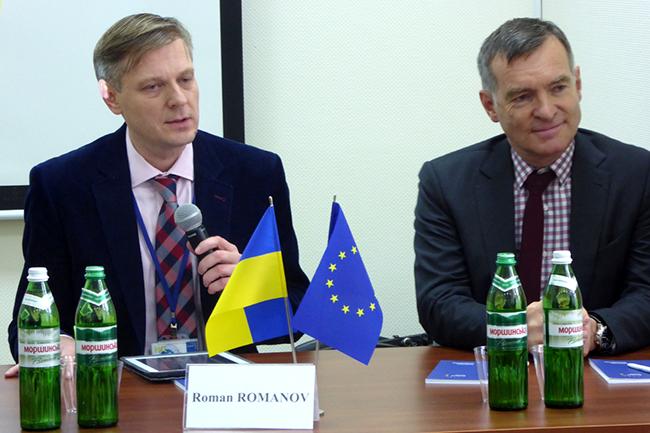Human Rights in oblasts: A report calling for action
November 18, 2015
“Human Rights Behind Closed Doors” is the eloquent title. And it’s a “fact-based, rather than opinion based study report”, underlined Roman Romanov, Director of the International Renaissance Foundation (IRF)’s Human Rights and Justice Program Initiative, by presenting it at the European Union Advisory Mission headquarters. 827 hours of observations and hundreds of interviews framed a thorough, analytical, documented study on the actual respect of procedural safeguards for apprehended persons in several Ukrainian Oblasts: Zakarpattya, Dnipropetrovsk, Odessa, Khmelnytsky, as well as the city of Kiev.

Outcomes are largely appalling in relation to fundamental rights of the arrested: to have access to a lawyer, to be informed of the accusation, to silence, to medical assistance, to translation. A timely involvement of attorneys (FLA) is a rare event: in 100 percent of checked cases the report did not include the place, date and time of actual apprehension. There is no practice of holding law enforcement officials responsible for suspects’ rights. Medical assistance is provided only when officers perceive a real threat to life. Also, there is no mechanism for involving translators for those who do not master Ukrainian (which was assessed for 18 percent of the apprehended persons).

A special focus is laid on information and awareness. Policemen are hardly conscious of those basic provisions and their violations, and the same relates to the majority of citizen. This is a priority challenge as such. “When people know their rights they can protect themselves better,” noted Yurii Bielousov, Deputy Head of Ombudsman’s Office for the Realisation of Preventing Mechanisms.
The list of condolences is even longer, but some more clarification needed. The report focused on challenges in a few regions only, but law enforcement agents’ good practices were checked too. Moreover, the project was supported by the Ministry of Internal Affairs of Ukraine. “We had full access to all data,” congratulated Mr. Romanov. This is an asset in itself, as it was the participation of the General Prosecutor’s representatives, who are scheduled to participate to the next IRF research, focusing precisely on Prosecutors’ role.
A very relevant conclusion is about the strong differences among the oblasts (regions), though within the same, now-evolving norms. “Legislation does not mean immediate delivery, the reform process should rather concentrate on the level of implementation,” reminded the IRF Director.
This research was made in coordination with the Ukrainian Parliament Commissioner for Human Rights, the Coordination Centre for Legal Aid Provision, the Centre for Research on Challenges of the Rule of Law and Its Implementation in Ukraine of the National University of “Kyiv-Mohyla Academy”. “It is teaching work combining academic research and practical experience on the spot, involving law enforcement agencies as well as NGOs,” emphasized EUAM Deputy Head Hugues Fantou. “It’s an emblem of the method we want to promote”, he added.


